Azerbaijan's successful hosting of the 29th session of the Conference of the Parties (COP29) to the United Nations Framework Convention on Climate Change (UNFCCC) has set a new standard for global climate diplomacy. Organized under the theme "In Solidarity for a Green World," COP29 in Baku not only witnessed unprecedented participation but also delivered historic breakthroughs in climate diplomacy.
With less than a year to prepare, Azerbaijan’s meticulous organization and unwavering commitment set a new benchmark for future climate summits. The event attracted over 76,000 participants, including 80 heads of state and government, highlighting Azerbaijan's growing influence on the global stage. President Ilham Aliyev’s leadership and Azerbaijan’s ability to deliver on critical issues solidified the summit’s legacy as a turning point in climate diplomacy.
Azerbaijan's leadership extended beyond financial mechanisms, highlighting the environmental and climate struggles of historically marginalized regions. Special focus was placed on the long-lasting environmental consequences of colonial exploitation. Side events at COP29 raised awareness of how colonial legacies have exacerbated climate vulnerabilities, particularly in Africa and small island nations.
COP29 highlighted Azerbaijan’s emergence as a pivotal player in climate diplomacy. The country’s leadership in organizing the third board meeting of the Loss and Damage Fund and fostering partnerships with global institutions, including the World Bank, reflects its proactive stance. The presidency also saw significant pledges from multilateral development banks (MDBs), which committed to an annual climate finance allocation of $170 billion, with $120 billion earmarked for implementation by 2030. These funds are instrumental in bridging the financial gap for low- and middle-income countries striving to combat climate change.
One of the most notable outcomes of COP29 was the operationalization of the Loss and Damage Fund, a vital mechanism designed to support countries grappling with the devastating impacts of climate change. The fund, which had been discussed for years, was finally launched with actionable frameworks. The first projects under this fund are expected to roll out in 2025, focusing on rebuilding disaster-hit infrastructure, enhancing adaptive capacities, and supporting displaced communities.
In addition, COP29 achieved full functionality for Article 6 of the Paris Agreement, unlocking the potential of carbon markets. This long-awaited agreement ensures transparency and integrity in international carbon trading, allowing nations to collaborate effectively in reducing emissions. The operationalization of Article 6 is expected to lower the costs of implementing national climate plans by up to $250 billion annually, paving the way for more ambitious climate action.
The New Collective Quantified Goal (NCQG) was another milestone, with global leaders agreeing to a target of $300 billion in climate finance for developing countries by 2035. This landmark agreement acknowledges the disproportionate burden faced by small island nations and least-developed countries while fostering solidarity between developed and developing nations.
The "Baku Breakthrough," as it has been termed, marks a turning point in climate negotiations. Guided by the slogan "In Solidarity for a Green World," Azerbaijan acted as an honest broker, bridging the divide between developed and developing nations.
Guided by a strong moral compass, the summit prioritized the concerns of vulnerable nations most affected by climate change. President Aliyev’s call for climate justice resonated globally, as Azerbaijan championed the cause of small island developing states and regions grappling with environmental degradation. Azerbaijan facilitated open and transparent negotiations, earning praise for acting as an impartial broker to ensure effective multilateralism. The resulting agreements reflected a shared commitment to address the pressing challenges of climate change while leaving no nation behind.
Achievements of COP29
Loss and Damage Fund: The operationalization of this critical fund paves the way for climate resilience projects beginning in 2025. It aims to address climate-induced losses by financing infrastructure rebuilding, supporting displaced communities, and enhancing disaster preparedness.
Article 6 Implementation: After nearly a decade of stalled negotiations, COP29 delivered a full alignment of Article 6 of the Paris Agreement, enabling robust and transparent carbon markets. This will significantly lower the cost of implementing national climate plans, potentially saving $250 billion annually.
New Collective Quantified Goal (NCQG): A landmark agreement to mobilize $300 billion by 2035 for developing countries was reached. This fund aims to enhance their ability to cope with climate change's adverse impacts, marking a new era in climate finance.
Multilateral Development Banks' (MDBs) Commitment: MDBs pledged $170 billion annually for climate finance, with $120 billion earmarked for low- and middle-income countries by 2030.
Fostering Innovation and Green Transition
Azerbaijan introduced 14 initiatives to accelerate the transition to renewable energy and address global water challenges. Among these, the Baku Water Dialogue emerged as a transformative platform, aiming to integrate water issues into global climate policy. This initiative aligns with the COP29 Water for Climate Action Declaration, which seeks to strengthen scientific foundations, create new partnerships, and develop sustainable solutions for water-related challenges.
The conference also served as a platform for Azerbaijan to promote the Baku Water Dialogue, an innovative initiative addressing water scarcity and its intersection with climate change. The dialogue aims to integrate water-related issues into global policy frameworks, fostering cooperation on sustainable water management.
Tackling Climate-Induced Loss and Damage
The operationalization of the Loss and Damage Fund at COP29 is a significant step towards addressing the financial needs of climate-vulnerable nations. Countries such as Pakistan, facing recurrent floods, could use the fund for resilient housing, early warning systems, and disaster preparedness. Similarly, small island states confronting rising sea levels can invest in seawalls, mangrove restoration, and community relocation plans.
To maximize the fund’s impact, Azerbaijan advocated for innovative financing mechanisms, including green bonds and climate insurance. Moving forward, the country aims to leverage its leadership at COP29 to champion green technologies, foster international partnerships, and accelerate the transition to a sustainable economy.
With the next generation of Nationally Determined Contributions (NDCs) due in February 2025, Azerbaijan’s presidency has laid the groundwork for countries to commit to more ambitious climate plans. The operationalization of Article 6, combined with the NCQG and Loss and Damage Fund, ensures that these plans will have the necessary financial and technical support.
President Ilham Aliyev's emphasis on inclusivity and equity has established Azerbaijan as a champion of multilateralism. The achievements of COP29 are expected to have a lasting impact on global climate action.
As Azerbaijan transitions to a green economy, its efforts serve as a model for other nations. The country's comprehensive approach to addressing climate change—from renewable energy projects to water resource management—illustrates the multifaceted nature of the climate crisis. Azerbaijan’s success at COP29 underscores the importance of persistent leadership and global solidarity. COP29 in Baku was not just another climate summit, it was a defining moment in global climate diplomacy. Through visionary leadership, Azerbaijan demonstrated that with solidarity, innovation, and determination, the world can achieve transformative progress in addressing climate change.

Mr. Khalid Taimur Akram, Executive Director, Pakistan Research Center for a Community with Shared Future (PRCCSF), Islamabad, exclusively for AzVision.az
AzVision.az
More about: Azerbaijan COP29















































